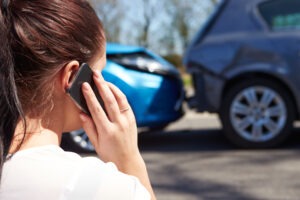
Experiencing a car accident can be deeply unsettling and daunting, especially when your actions did not cause the collision. While it’s crucial to focus on your health and safety right after the incident, being aware of the proper procedures can aid in safeguarding your legal rights and facilitating a seamless insurance claim process.
In this article, we’ll navigate you through the crucial measures to undertake following a car accident where you’re not the guilty party. Remember, maintaining composure and being well-informed can greatly impact how you deal with the repercussions of such occurrences.
Contact the Authorities
As soon as the accident occurs, your first action should be to contact local law enforcement or emergency services, even if the collision seems insignificant. It’s important not to underestimate the impact of what might initially seem like a minor accident, as unforeseen consequences can emerge later. Immediate contact with relevant authorities ensures that immediate assistance, if required, is available.
The role of the police in this situation is pivotal inasmuch as they are responsible for documenting the accident in its entirety. This involves gathering evidence from the scene, including photographs, witness testimonies, and the physical state of the vehicles involved. Their objective, comprehensive perspective on the event can be crucial when determining what exactly transpired.
The culmination of their investigative work resulted in the creation of an official accident report. This document becomes vital evidence regarding insurance claims and any subsequent legal proceedings. It offers an unbiased account of the incident and can significantly bolster your case if you’re not at fault.
For a free legal consultation, call (678) 888-2222
Gather Information
Following the accident’s immediate aftermath, engaging in an information exchange with all other drivers (s) implicated in the event is important. While seemingly straightforward, this process is crucial and requires attention to detail to ensure nothing is missed. Here’s a list of the necessary information that should be obtained from the other parties involved:
- Full Name: Start by getting the complete name of the other driver(s). This information must be accurate for any subsequent legal or insurance-related matters.
- Contact Details: Collect their phone number, email address, and physical address if possible. These will serve as points of contact throughout the claims process.
- Driver’s License Number: This unique identifier is key to accurately identifying the other driver(s) in official reports or legal documents.
- License Plate Number: Document the number on their license plate. This can help track their vehicle if needed.
- Insurance Information: Gather their insurance company’s name and policy number. This information will be crucial when liaising with insurance providers during the claims process.
- Make and Model of Their Vehicle: Note the specific details of their car, such as its make, model, and color.
In addition to the information exchange with the other driver(s), gathering details from any bystanders or witnesses present during the accident is important. These individuals might have observed details that you or the other driver(s) did not. Collect their full names and contact details, as their testimonies could be invaluable when piecing together the events leading up to the accident.
Document the Scene
In the aftermath of a car accident, it’s crucial to document the incident’s circumstances as much as possible by taking photos. Pay attention to documenting any skid marks, as they can be used to understand the sequence of events leading to the collision. Capture the state of the road conditions, as they could contribute to the accident.
In the second step, include any relevant landmarks or surrounding elements in your photos or videos. Things like traffic signals, road signs, or any other unique identifiers of the location can provide useful context. Aside from visual evidence, recording important details in writing is imperative. These should include the exact time and date of the incident and the specific location where it occurred.
Click to contact our personal injury lawyers today
Notify Your Insurance Company
As soon as possible, contact your insurance company to report the accident, providing precise and comprehensive information regarding the incident. Even if you’re under the impression that the other party’s insurance should bear the cost of the damages, prompt communication with your insurer is crucial. Delays could lead to complications with your claim in the future.
Complete a Free Case Evaluation form now
Seek Medical Attention
Regardless of the absence of any immediate discomfort or noticeable injuries, it’s vital to obtain a medical evaluation following a car accident. Certain injuries may not manifest symptoms immediately, and a timely medical examination can help uncover latent issues. Ensure you maintain a detailed account of all medical procedures, prescribed medications, and costs associated with the accident, as these might be eligible for reimbursement.
Preserve Evidence
Maintain and safeguard all documentation linked to the accident, including medical documents, repair cost estimates, receipts for vehicle repairs, and any other pertinent paperwork related to the incident. This documentation will fortify your position during the claims proceedings and offer a thorough record of the damages sustained.
Consult an Attorney
In the wake of a car accident, it might be valuable to seek advice from a reputable attorney specializing in personal injury or car accident cases. This consideration becomes particularly important if the accident has led to substantial damages or injuries.
The Expertise of an Attorney
A seasoned attorney brings a wealth of knowledge and experience to the table. They are adept in the nuances of accident cases and understand how to navigate the legal complexities that can arise. Their expertise enables them to provide reliable guidance throughout the process, from the initial assessment to the final resolution of your case.
Negotiation and Representation
An experienced attorney can also be an adept negotiator when dealing with insurance companies. These companies often employ tactics to minimize their liability, and having a professional negotiator on your side can ensure you receive a fair settlement. Attorneys know the right strings to pull and what evidence to emphasize, effectively countering low settlement offers or unjust denials.
Protection of Your Legal Rights
An attorney can educate you about your rights, ensuring that you’re not taken advantage of and that all legal pathways to compensation are explored. They will also ensure that all legal procedures and timelines are strictly followed, preventing potential pitfalls that could harm your case. Contact Barrios Virguez to learn how we can help you.
Call or text (678) 888-2222 or complete a Free Case Evaluation form
